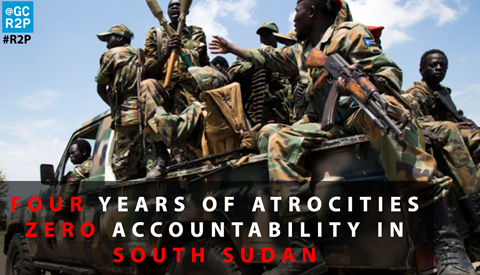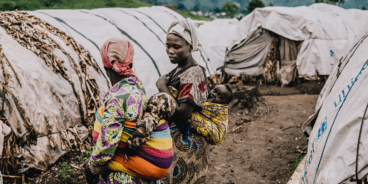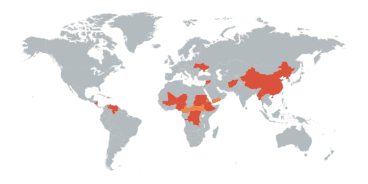
Atrocity Alert No. 86: Yemen, Afghanistan and South Sudan
Atrocity Alert is a weekly publication by the Global Centre for the Responsibility to Protect highlighting situations where populations are at risk of, or are enduring, mass atrocity crimes.
Yemen’s New Year Begins With Deadly Airstrikes
As 2018 begins, Yemen remains the largest humanitarian crisis in the world. An estimated 22.2 million people – over 75 percent of the population – require humanitarian assistance and approximately 8 million people are at risk of famine. The destruction of civilian infrastructure has led to the largest cholera outbreak in modern history, with more than 1 million recorded cases. Incessant airstrikes and indiscriminate mortar and artillery fire have rendered half of the country’s health facilities unable to function.
Despite the scale of Yemen’s catastrophe, intense fighting and attacks on civilians continue. Over a ten day period between 16-26 December at least 109 civilians were killed in airstrikes carried out by the international military coalition led by Saudi Arabia and the United Arab Emirates (UAE). At least 68 civilians, including children, were killed on 26 December alone when airstrikes hit a market in Taizz governorate and a family farm in Hodeida governorate. On the first day of 2018 a further 23 people were killed in an airstrike near a market in Hodeida city. In response, the UN Humanitarian Coordinator for Yemen, Jamie McGoldrick, stated that “these incidents prove the complete disregard for human life that all parties, including the Saudi-led Coalition, continue to show in this absurd war.”
Since the conflict in Yemen escalated in March 2015, the Saudi/UAE-led military coalition, government forces, armed Houthis and forces affiliated with former President Ali Abdullah Saleh have all been responsible for possible war crimes. The UN estimates that at least 5,500 civilians have been killed, although accurate reporting is impossible and the actual death toll is considered to be much higher.
All parties to Yemen’s conflict must uphold their obligations under International Humanitarian Law to protect civilians and distinguish between civilian and military objects. After more than 1,000 days of war and numerous failed ceasefires, the UN Security Council must finally take action to enable unimpeded humanitarian access, facilitate a permanent cessation of hostilities, and a return to meaningful peace negotiations.
#YemenCantWait 1000 Days of War
Afghanistan’s Year of “Unspeakable Atrocities”
Last Thursday, 28 December, 41 people were killed in a suicide bomb attack by the so-called Islamic State in Iraq and the Levant-Khorasan (ISIL-K) on a Shia cultural center in Kabul. Most of the victims were students who had gathered at the center for a discussion on the anniversary of the 1979 Soviet invasion of Afghanistan. The acting head of the UN Assistance Mission in Afghanistan (UNAMA) denounced the attack as “another truly despicable crime in a year already marked by unspeakable atrocities.”
The bombing at the Shia cultural center was the seventh ISIL-K terrorist attack inside Kabul since 20 October. As ISIL’s influence in Iraq and Syria diminishes, its Afghan affiliate poses a growing threat to civilians who have already endured more than 15 years of armed conflict between the Taliban and the Afghan government. A recent UNAMA report documented the deaths of 273 civilians since January 2016 due to attacks targeting places of worship and people practicing their religion. The majority of these sectarian attacks have been directed at Afghanistan’s vulnerable Shia minority by ISIL-K and other armed extremist groups.
The international community should continue to provide support to the Afghan government to help combat armed extremist groups, while recognizing that ISIL-K cannot be defeated by arms alone. Countering violent extremism while promoting good governance and the rule of law remains essential.
Another Broken Agreement in South Sudan?
On 21 December the first round of the High-Level Revitalization Forum, a regional diplomatic initiative to reinvigorate South Sudan’s moribund 2015 Peace Agreement, concluded with the signing of an “Agreement on the Cessation of Hostilities, Protection of Civilians and Humanitarian Access.” However, just hours after the cessation of hostilities came into effect on 24 December, both the South Sudanese government and the main opposition group, the Sudan People’s Liberation Movement in Opposition (SPLM-IO), publicly accused each other of violating the agreement.
Over the last week ceasefire violations and fighting have been reported in Unity, Central Equitoria and Eastern Equatoria States. Inter-communal clashes have also continued, with at least 22 people reportedly killed in a series of attacks between rival communities in Bor, Jonglei State. Last Friday, 29 December, the Chairperson of the Intergovernmental Authority on Development (IGAD) Council of Ministers demanded an immediate end to all violence.
Since the civil war began in December 2013, all sides in South Sudan have routinely violated the terms of various peace agreements, committed atrocities and allowed their country to sink deeper into an economic, political and humanitarian crisis. At least 50,000 South Sudanese were killed during the civil war and an estimated 4 million people have been forced to flee their homes since 2013.

On 14 December last year the UN Security Council issued a Presidential Statement in support of the High-Level Revitalization Forum and warned that there would be a “cost and consequence for those who violate the agreement.” Now is the time for IGAD and the Security Council to hold South Sudan’s leaders accountable. The Security Council should immediately impose an arms embargo on South Sudan and targeted sanctions against all political leaders and senior military figures, regardless of their affiliation, implicated in atrocities and violations of the recently signed Agreement.

